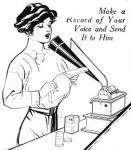Remarkable stuff. Opens some interesting options for long-term archiving audio… print a graphical representation on paper and file it away. It might be the only method available for restoring 21st century recordings 200 year from now.

One thing it seems the media is missing though is this isn’t the first “recording” per se. IMO, Edison’s status is not threatened (though a phonautogram has been in the Smithsonian for ages and always claimed by some to be the first recording device, so it’s debatable).
Here’s why:
The French inventor’s objective was to create a graph to be observed with the eye, not to reproduce sound. Édouard-Léon Scott de Martinville was obviously an extraordinary individual, but he had no plans or concept of reproducing audio from the images he recorded. The graph was the final product for the purpose of visually studying sound vibrations. He certainly advanced the science in that regard.
Remember there was no way or even concept of playing back these graphical records. No one, including de Martinville ever heard them. We are the first to hear them… 150 years later. And this is thanks to the scientists at Berkley National Laboratory who rendered a graphical record of sound vibrations into something we can hear. This is really cool, but it is more comparable to taking a seismographical record and reproducing the sound of an earthquake. This would make a graph from the earliest seismograph the first recording. So the honor may go to Italian physicist Luigi Palmieri for his 1855 seismometer.
Edison on the other hand, set out to build a device that both captured and reproduced sound vibrations for listening, which he accomplished at that time. Edison, Bell and others certainly benefited from Scott de Martinville’s work, which they were familiar with.
Both inventors were trying to accomplish different things and both succeeded. Scott de Martinville was even critical of Edison’s work, saying,
“The important invention is writing the sound down, visualizing it. Reproducing it is incidental.” So even after Edison’s breakthrough Scott de Martinville did not appreciate the potential of reproducing audio.
None of this makes Scott de Martinville’s accomplishments or this haunting sound any less fascinating, but the, “Rest of the story” that might be overlooked is in the details of how the Berkley researches managed to transform something into sound that was never intended to be heard.
When I was about 10 years old my dad bought for me a kit to build a functioning Edison phonograph. I remember putting it together a little each night with my dad… good memories. After some trial and error we succeeded in recording and playing back our voices using aluminum foil as the medium. Unlike the phonautogram, you can’t study the etching of the cylinder phonograph with the naked eye; it looks more like the grooves on a vinyl record.
So in summery, the phonautogram was meant to be seen while the Edison phonograph was meant to be heard.





